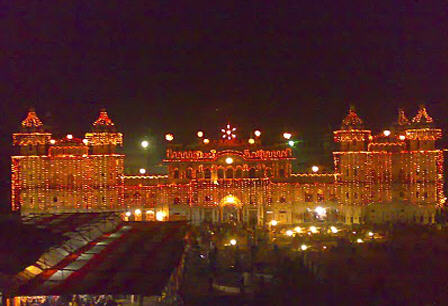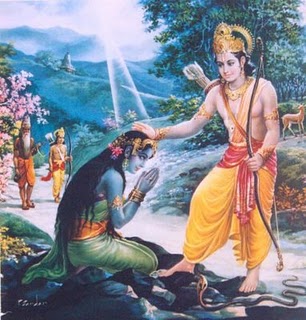 Deliverance of Ahilya in Mithila : Upon seeing the beautiful city of King Janaka, all the sages accompanying Vishvamitra began praising the city of Mithila, exclaiming “Excellent! Excellent!” Seeing there on the outskirts of Mithila a lovely hermitage that was old and desolate in a grove of trees, Rama asked Vishvamitra: “What is this place that so resembles a hermitage, but is devoid of sages? I wish to hear, O master, whose hermitage this was previously.”
Deliverance of Ahilya in Mithila : Upon seeing the beautiful city of King Janaka, all the sages accompanying Vishvamitra began praising the city of Mithila, exclaiming “Excellent! Excellent!” Seeing there on the outskirts of Mithila a lovely hermitage that was old and desolate in a grove of trees, Rama asked Vishvamitra: “What is this place that so resembles a hermitage, but is devoid of sages? I wish to hear, O master, whose hermitage this was previously.”
Hearing what Lord Rama said, the great sage Vishvamitra, who was skilled at speaking, replied: “Alas! I shall tell you. Listen in detail, O descendant of the Raghu Dynasty, to which great soul this hermitage belongs and by whose anger it was cursed. Previously this hermitage, which looked like heaven and was honored by all the gods, belonged to the great soul Gautama. At that time, the famous sage practiced austerities here with his wife, Ahalya, for quite a number of years, O prince. Once, when Indra was aware that Gautama was absent from the hermitage, he came disguised as Gautama and said the following to Ahalya: “Those who are anxious for sexual enjoyment do not wait for the proper time for conception of a child. Therefore, O shapely woman, I wish to unite with you.” Recognizing him to be Indra disguised as her husband, she unwisely agreed, out of eagerness, to enjoy with the king of the gods.
Later, when she was inwardly gratified by her accomplishment, she said to Indra: “I have achieved my goal, O best of the gods. Leave this place quickly, my lord. Guard yourself and myself in every way possible from my husband Gautama.” Laughing, Indra spoke the following words to Ahalya: “Lovely lady, I am very satisfied. I shall depart just as I came.” In that way, he began to leave the hut, hurrying due to fear, being apprehensive of Gautama’s return. Just then he saw entering the hut, the great sage Gautama, who was difficult to overcome for gods and demons because of his strength acquired through the practice of austerities. He was drenched with water from the holy river and was shining like fire. In his hands he carried firewood and kusha grass. Seeing Gautama, Indra was mortified and hung his head down.
Seeing Indra disguised as him and guilty of misconduct, the sage Gautama, who was well-behaved, spoke out of anger: “You, O fool, have disguised yourself as me. For this misconduct you shall lose your testicles.” When the great soul Gautama had spoken these angry words, Indra’s testicles fell to the ground that very moment. As Indra had been cursed, even so did Gautama curse his wife: “You will remain here for many thousands of years without food, living on air alone, practicing austerities and sleeping on a pile of ashes. You will dwell in this hermitage unseen by all living beings. When, however, Rama, the son of Dasharatha, comes to this terrible grove, you will be absolved. O immoral woman, by offering proper hospitality to Him, you will become free from lust and illusion. You will then regain your original body at my side, being overwhelmed with delight.” Having spoken in this way to the immoral woman, the powerful Gautama left this hermitage and went to the pleasant Himalaya Mountains that are frequented by siddhas and caranas and began practicing austerities.
Being castrated, Indra, with fearful eyes, said to the siddhas, gandharvas, caranas and gods headed by Agni: “I have performed a service for the gods by interrupting the great soul Gautama’s austerities by invoking his anger. Now I have been castrated by his anger and Ahalya has been made formless. By this I interrupted his practice of austerities. Since I was only engaged in the welfare of the gods, you, O best of gods, accompanied by the sages and caranas, should restore my testicles.”
Hearing the supplication of Indra, the performer of one hundred horse sacrifices, the gods, headed by Agni and accompanied by the Maruts, approached the celestial forefathers and said: “Here is a ram with testicles and Indra has been deprived of his testicles. Taking the testicles from the ram, immediately attach them to Indra. The castrated ram will please you greatly. To those men who to propitiate you offer you a castrated ram, you will bestow an undecaying and abundant reward.”
Hearing Agni’s request, the assembled celestial forefathers removed the testicles from the ram and attached them to Indra. From then on, O descendant of Kakutstha, the celestial forefathers have enjoyed offerings of castrated rams and have conferred upon the offerers suitable rewards. Since then, O Rama, by the strength of the great soul Gautama’s austerity, Indra has had the testicles of a ram. Now step inside the hermitage of the pious sage and deliver the highly blessed Ahalya, who previously had a celestial form.”
After hearing Vishvamitra’s words, Rama, accompanied by Lakshmana, entered the hermitage, being lead by Vishvamitra. There Rama saw the fortunate lady who was glowing due to the practice of austerities and who was unable to be seen by the gods and demons, much less by ordinary people, even when approached closely. Her heavenly form was originally striated by Lord Brahma with great effort and resembled a striated of magical powers. She resembled a blazing tongue of fire enveloped in smoke, like the halo of the full moon covered by mist or a cloud, or like the undeterrable radiance of the sun shining through a cloud. By the curse of Gautama, she had been rendered invisible to the three worlds until she would be seen by Rama. The period of the curse had now come to an end as she was seen by them all.
Rama and Lakshman then caught hold of her feet with delight. Remembering the words of Gautama, she welcomed the two princes. With a composed mind, she offered the two water for washing the feet and hands and other acts of hospitality according to scriptural rule. At that time, the gods showered down flowers and beat kettle drums, while the gandharvas and apsaras celebrated jubilantly. Exclaiming “Very good! Very good!” the gods honored the lady Ahalya, whose body was purified by the power of her austerity and who had remained obedient to Gautama. Gautama was also happy to be reunited with his glorious wife Ahalya. After offering proper respects to Lord Rama, the great ascetic engaged himself in the practice of austerities. After personally receiving the highest honors from the great sage Gautama, Rama proceeded to Mithila.
1) Krishna visits Bahulashva and Srutadeva in Mithila :
Chapter Eighty Six of Tenth canto of Srimad Bhagavatam. This chapter describes how Arjuna kidnapped Subhadra with a great fight. It also describes how Krsna went to Mithila to favor His devotee Bahulasva and stay at the house of Srutadeva and advise them about spiritual advancement.
There was a brahmana devotee of Sri Krsna’s named Srutadeva, who lived in the city of Mithila. By the will of Providence, he could earn only barely enough to keep himself and his family alive. Still, he was always satisfied and spent all his time executing his religious duties. King Bahulasva was another great devotee of the Lord residing in Mithila. A member of the dynasty in which King Janaka had appeared, Bahulasva ruled over the whole province of Videha, yet he remained as detached from material wealth as Srutadeva. Pleased with the devotional attitude of both these great souls, Lord Krsna went on His chariot to Mithila to visit them, taking along Narada and several other learned sages. The people of Mithila greeted the Lord and His saintly entourage with great delight. Bearing various gifts for Krsna, they bowed down and offered obeisances to Him and the sages.
Bahulasva and Srutadeva both stepped forward and respectfully requested Sri Krsna to visit their homes. To satisfy both of them, the Lord expanded Himself and went to each of their homes simultaneously. They each worshiped Him suitably, offered prayers, washed His feet and then sprinkled themselves and all their family members with the washed water. Lord Krsna then praised the sages who were with Him and glorified brahmanas in general. He also imparted instructions to His hosts concerning devotional service. Understanding these instructions, both Srutadeva and Bahulasva honored the sages and Lord Sri Krsna with single-minded devotion. Lord Krsna then returned to Dvaraka.
2) Krishna and Balaram chase and kill Satadhanva :
Chapter fifty seventh of tenth canto of Srimad Bhagavatam describes how Lord Krsna, after the murder of Satrajit, killed Satadhanva and had Akrura bring the Syamantaka jewel back to Dvaraka.
When Lord Sri Krsna heard that the Pandavas had supposedly been burned to death in the palace of lac, He went to Hastinapura with Lord Baladeva to maintain the principles of worldly protocol, even though, being omniscient, He knew the report was false. When Krsna was out of Dvaraka, Akrura and Kritavarma incited Satadhanva to steal the Syamantaka jewel from Satrajit. Bewildered by their words, the sinful Satadhanva murdered King Satrajit in his sleep and stole the gem. Queen Satyabhama was overcome with grief at the death of her father, and she rushed to Hastinapura to report the sorrowful news to Sri Krsna. Together with Lord Baladeva, Krsna then returned to Dvaraka to kill Satadhanva.
Satadhanva went to Akrura and Kritavarma to beg for help, but when they refused, he left the jewel with Akrura and fled for his life. Krsna and Balarama pursued him, and Lord Krsna beheaded him with His sharp-edged disc. When the Lord could not find the Syamantaka jewel on Satadhanva’s, Baladeva told Him that Satadhanva must have left it in someone’s care. Baladeva further suggested that Krsna return to Dvaraka to find the jewel while He, Baladeva, would take the opportunity to visit the King of Videha. Thus Lord Balarama travelled to Mithila and remained there for a few years, during which He taught King Duryodhana the art of fighting with a club.
Lord Krsna returned to Dvaraka and had the funeral rites performed for Satrajit. When Akrura and Kritavarma heard how Satadhanva had met his death, they fled Dvaraka. Soon many kinds of disturbances-mental, physical and soon began to afflict Dvaraka, and the citizens concluded that the cause of these troubles must be Akrura’s exile. The city elders explained, “Once there was a drought in Benares, and the king of the region gave his daughter in marriage to Akrura’s father, who was visiting Benares at the time. As a result of this gift, the drought ended.” The elders, thinking Akrura had the same power as his father, declared that Akrura should be brought back.
Lord Krsna knew that Akrura’s exile was not the main cause of the disturbances. Still, He had Akrura brought back to Dvaraka, and after properly honoring him with worship and greeting him with sweet words, Krsna told him, “I know Satadhanva left the jewel in your care. Since Satrajit had no sons, his daughter’s offspring are the just claimants to whatever property he has left behind. Nonetheless, it would be best for you to keep the troublesome jewel in your care. Just let Me show it once to My relatives.” Akrura presented Krsna with the jewel, which shone as brilliantly as the sun, and after the Lord had shown it to His family members He returned it to Akrura.
Meanwhile at Mithila, When the King of Mithila saw the arrival of Sri Balarama in his city, he was most pleased and received the Lord with great honor and hospitality. He gave many valuable presents to Balaramaji in order to seek His pleasure. At this time Sri Balarama lived in the city for several years as the honored guest of the King of Mithila, Janaka Maharaja. During this time, Duryodhana, the eldest son of Dhritarastra, took the opportunity to come to Balarama and learn from Him the art of fighting with a club.
After killing Satadhanva, Krsna returned to Dvaraka, and in order to please His wife Satyabhama, He informed her of the death of Satadhanva, the killer of her father. But He also informed her that the jewel had not been found in his possession. Then, according to religious principles, Krsna, along with Satyabhama, performed ceremonies in honor of His departed father-in-law. In those ceremonies all the friends and relatives of the family joined together.
3) King Nimi and the Nine Yogendras mentioned in 11th canto of Srimad Bhagavtam:
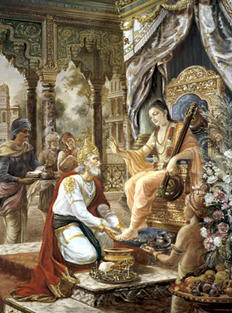
In this second chapter, Narada gives instructions in bhagavata-dharma to the faithful and inquisitive Vasudeva by recounting a conversation between Maharaja Nimi and the nine Yogendras. Greatly eager to see Lord Krsna, Devarsi Narada resided almost exclusively in Dvaraka. Vasudeva, bewildered by the Lord’s illusory potency, had previously offered worship to the Supreme Lord Ananta for the purpose of getting a son, but had failed to worship Him for liberation.
Once Narada arrived at the home of Vasudeva, who worshiped him according to proper etiquette, greeted him respectfully and requested to hear about pure devotional service, which frees one from all kinds of fear. Narada praised Vasudeva’s fixed intelligence and then related the ancient history of the conversation between the nine Yogendras, who were sons of Lord Anabhadeva, and Nimi, the King of Videha.
Svayambhuva Manu’s son was Priyavrata. His son was agnedhra, whose son was Nabhi. Lord Anabhadeva, the plenary portion of Vasudeva, incarnated as the son of Nabhi. The oldest of Anabhadeva’s one hundred sons was Bharata, an exalted devotee of Narayana by whose name this earth, previously called Ajanabha-varna, became famous as Bharata-varna. Nine other sons of Anabhadeva were widely known as the nava-yogendras: Kavi, Havir, Antarekna, Prabuddha, Pippalayana, avirhotra, Drumila, Camasa and Karabhajana. They were well versed in knowledge of the self, fixed in their goal and always striving for perfection. Nine other sons of Anabhadeva took on the duty of ksatriyas and became masters of the nine dvipas comprising Bharata-varsha. His other eighty-one sons became brahmanas expert in smriti doctrines who propagated the path of fruitive sacrifice.
The nine Yogendras, free to move without impediment, travelled everywhere as they wished. They were direct associates of the Supreme Personality of Godhead, Madhusudana, and wandered freely to give protection to the various planets in the universe. The human body can be lost at any moment, but it is still a very rare attainment. Still rarer is to get the association of the confidential devotees of the Lord of Vaikuntha while in this very human body. The association of such saintly persons, even for a fraction of a second, bestows all benefits on a living being. Therefore King Nimi offered the nine Yogendras suitable seats, worshiped them, humbled himself with obeisances and joyfully inquired from them about bhagavata-dharma. Bhagavata-dharma, or pure devotional service to the Lord, is the only means of ultimate good fortune for the soul. The Supreme Lord, being pleased by such service, offers His own self to the devotee.
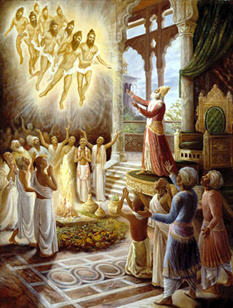 In answer to the King’s question, one of the nine Yogendras, Kavi, spoke as follows: “Those means of advancement which are described by the Personality of Godhead Himself and which enable even foolish persons easily to achieve perfect self-realization are called bhagavata-dharma. This bhagavata-dharma, manifested as service to the lotus feet of the infallible Supreme Lord, eradicates all fear for the living being. By abiding in bhagavata-dharma one will never stumble or fall, even while running with both eyes closed. Whatever one does with his body, mind, words, intelligence, consciousness, senses and natural proclivities should all be offered to Lord Narayaea. Living entities averse to the Lord’s lotus feet come under the control of the Lord’s illusory energy, maya. They forget the Lord’s identity and are trapped by the illusion of identifying with the temporary body. Under the sway of material attraction, they become greatly fearful. Thus the best thing for them is to surrender their very life energy to a qualified guru and execute worship of the Supreme Lord, the absolute controller of maya, with pure devotion. Just as by eating one gradually appeases his hunger and with every bite feels more and more satisfied and nourished, a surrendered devotee achieves detachment from all objects other than Krsna, gains direct personal experience of the Lord and relishes pure love for the Lord, all simultaneously.”
In answer to the King’s question, one of the nine Yogendras, Kavi, spoke as follows: “Those means of advancement which are described by the Personality of Godhead Himself and which enable even foolish persons easily to achieve perfect self-realization are called bhagavata-dharma. This bhagavata-dharma, manifested as service to the lotus feet of the infallible Supreme Lord, eradicates all fear for the living being. By abiding in bhagavata-dharma one will never stumble or fall, even while running with both eyes closed. Whatever one does with his body, mind, words, intelligence, consciousness, senses and natural proclivities should all be offered to Lord Narayaea. Living entities averse to the Lord’s lotus feet come under the control of the Lord’s illusory energy, maya. They forget the Lord’s identity and are trapped by the illusion of identifying with the temporary body. Under the sway of material attraction, they become greatly fearful. Thus the best thing for them is to surrender their very life energy to a qualified guru and execute worship of the Supreme Lord, the absolute controller of maya, with pure devotion. Just as by eating one gradually appeases his hunger and with every bite feels more and more satisfied and nourished, a surrendered devotee achieves detachment from all objects other than Krsna, gains direct personal experience of the Lord and relishes pure love for the Lord, all simultaneously.”
Next Havir spoke, describing the different characteristics of first-class, second-class and third-class devotees: “One who offers prescribed worship with faith to the Deity of Lord Vineu but has no devotion for Vaineavas and things related to Vineu is a materialistic devotee. One who shows love for the Lord, friendship for the Lord’s devotees, mercy for the ignorant and indifference for the enemies of Vineu and the Vaineavas is an intermediate devotee. And one who sees the presence of the Supreme Lord in everything and sees everything within the Lord is the topmost devotee.” The first-class devotees are described in eight verses, which conclude by stating that the first-class devotee keeps the Supreme Lord perpetually fastened to his own heart with ropes of affection. Lord Hari never leaves the heart of such a devotee.
4) The Vaishnava Poet Vidyapati from Mithila.
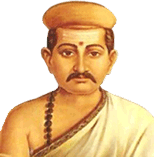 Vidyapati, a great and learned poet of Mithila, has said that the pleasure derived from friendship, society and family life in the material world is like a drop of water, but our hearts desire pleasure like an ocean.Vidyapati was a famous composer of songs about the pastimes of Radha-Krsna. He was an inhabitant of Mithila, born in a brahmana family. It is calculated that he composed his songs during the reign of King Sivasingha and Queen Laxmidevi, in the beginning of the fourteenth century of the Saka Era, almost one hundred years before the appearance of Lord Caitanya Mahaprabhu. The twelfth generation of Vidyapati’s descendants is still living. Vidyapati’s songs about the pastimes of Lord Krsna express intense feelings of separation from Krsna, and Sri Caitanya Mahaprabhu relished all those songs in His ecstasy of separation from Krsna. (CC adi lila13.42.)
Vidyapati, a great and learned poet of Mithila, has said that the pleasure derived from friendship, society and family life in the material world is like a drop of water, but our hearts desire pleasure like an ocean.Vidyapati was a famous composer of songs about the pastimes of Radha-Krsna. He was an inhabitant of Mithila, born in a brahmana family. It is calculated that he composed his songs during the reign of King Sivasingha and Queen Laxmidevi, in the beginning of the fourteenth century of the Saka Era, almost one hundred years before the appearance of Lord Caitanya Mahaprabhu. The twelfth generation of Vidyapati’s descendants is still living. Vidyapati’s songs about the pastimes of Lord Krsna express intense feelings of separation from Krsna, and Sri Caitanya Mahaprabhu relished all those songs in His ecstasy of separation from Krsna. (CC adi lila13.42.)
Sri Svarupa Damodara used to read the poems of Vidyapati and Chandidas and Jayadeva Gosvami’s Sri Geta-govinda. He used to make Caitanya Mahaprabhu very happy by singing these songs. (CC Madhya 10.116)
5) Adavaita Acharya meets Vidyapati at Mithila
Then Advaita Prabhu went to Mithila, the birthplace of Seta. He rolled on the ground there and then chanted and danced in ecstasy.
Now hear about the wonderful incident that took place at that time. The Lord heard a sweet, melodious song in glorification of Krsna. He rushed in the direction of the sound and found a first-class brahmaea sitting under a banyan tree singing the nectarean glories of Lord Krsna like a Gandharva. Advaita Prabhu was struck with wonder on hearing the descriptions of Krsna’s form. He was filled with love and embraced the brahmaea. On the pretext of embracing the brahmaea, Advaita bestowed His mercy by giving him love of God just as iron is turned to gold by the contact of touchstone.
The brahmaea understood that Advaita was the Supreme Lord and offered Him obeisances. Advaita remembered Lord Vineu and asked the brahmaea his name and the name of the author of the nectarean song.
Advaita Prabhu said, “Such a sweet composition is hardly heard, and the pleasing sound of your voice is most excellent. I became intoxicated by hearing that nectarean song of yours, and out of attraction I came running here.”
The brahmaea said, “My name is Vidyapati. Since I am maintained by the king, my consciousness is contaminated. I composed this song in this maddened condition. You became pleased with the song because You are a paramahamsa, who has accepted the essence of everything. Otherwise, who has the power to attract You? You have delivered me simply due to Your saintly qualities.”
Advaita Prabhu said, “What to speak of ordinary living entities, even Krsna Himself is attracted by your nectarean song. By some great fortune Krsna has bestowed His mercy on Me and I am able to associate with Vidyapati, the composer of this song.”
Saying this, Advaita embraced him again and then started for Ayodhya while remembering Lord Hari.
6) Sarvabhauma Bhattacharya in Mithila –
The original name of Sarvabhauma Bhattacharya was Vasudeva Bhattacharya. His place of birth, which is known as Vidyanagara. It is about two and a half miles away from the Navadvipa railway station, or Campahatti railway station. His father was a very much celebrated man of the name Mahesh Visharada. It is said that Sarvabhauma Bhattacharya was the greatest logician of his time in India. At Mithila, in Bihar, he became a student of a great professor named Paksadhara Mishra, who did not allow any student to note down his explanations of logic. SarvabhaumaBhattacharya was so talented, however, that he learned the explanations by heart, and when he later returned to Navadvipa he established a school for the study of logic, thus diminishing the importance of Mithila. Students from various parts of India still come to Navadvipa to study logic. According to some authoritative opinions, the celebrated logician Raghunatha Shiromani was also a student of SarvabhaumaBhattacharya’s. In effect, SarvabhaumaBhattacharya became the leader of all students of logic. Although he was a grhastha (householder), he even taught many sannyasis in the knowledge of logic.
7) Janak Maharaj in Gaur Lila came as Vallabhacharya, the father of Laxmipriya.
CB adi-khanda
TRANSLATION: There was one qualified brahmana in Navadvipa named Vallabhacarya, who was equal to Janaka Maharaja.
COMMENTARY: In the Gaura-ganoddesa dipika (44) it is stated: “Janaka, the great King of Mithila, has now appeared as Vallabhacarya. He is also accepted as Bhismaka, the father of Rukmini. Sri Janaki, Rukmini, and Lakshmi were all his daughters.”
10.48 : ta’na kanya ache-yena lakshmi murti-mati
niravadhi vipra tan’ra cinte yogya pati
TRANSLATION :He had a daughter who appeared to be the personification of Lakshmi. That brahmana was constantly searching for a qualified husband for her.
10.49 :daivelaknmeeka-dinagelagaiga-snanegauracandrahenaisamayeseikhane.
TRANSLATION : By providence, one day when Lakshmi went to take bath in the Ganges, Gauracandra was there at the same time.
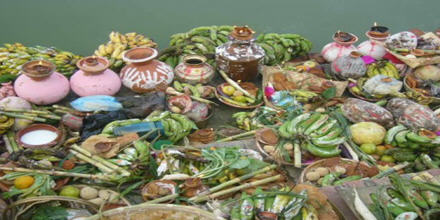
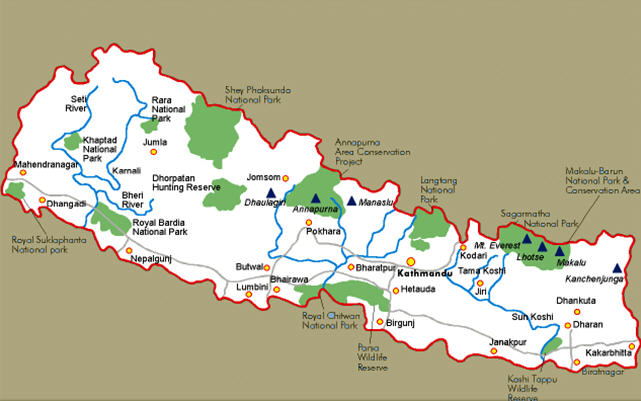
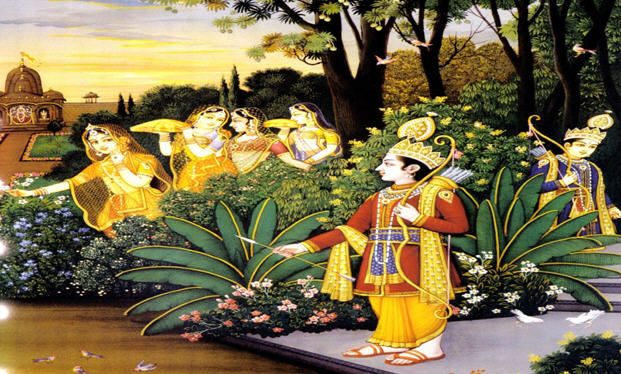
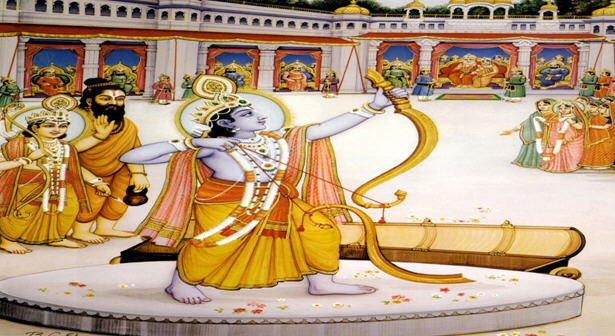

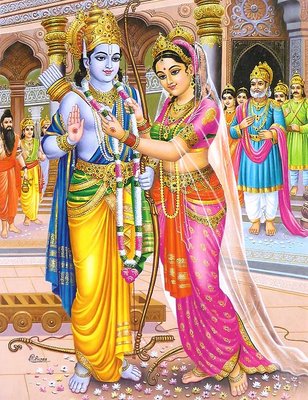
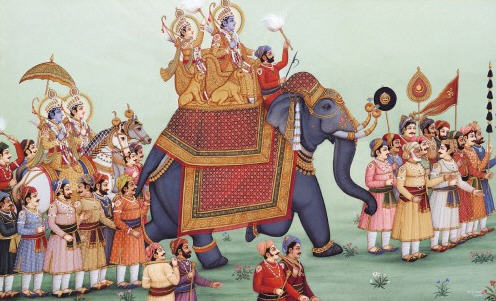
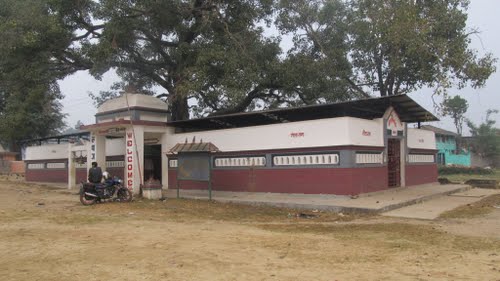
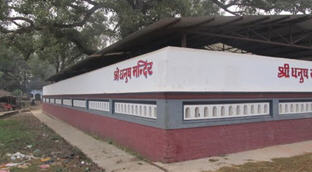 Ram and Sita are the two central characters of the great epic Ramayan. In the story, Ram strings a bow (originally belonged to Lord Shiva, the destroyer) and in the process, the bow breaks into three pieces. One piece flies up to heaven, another falls down into the depths of the underworld. Presently there is a huge pond called Dhanushsagar at this spot. The third piece flies to present day Dhanushadham, about 40 kilometers from Janakpur.
Ram and Sita are the two central characters of the great epic Ramayan. In the story, Ram strings a bow (originally belonged to Lord Shiva, the destroyer) and in the process, the bow breaks into three pieces. One piece flies up to heaven, another falls down into the depths of the underworld. Presently there is a huge pond called Dhanushsagar at this spot. The third piece flies to present day Dhanushadham, about 40 kilometers from Janakpur.